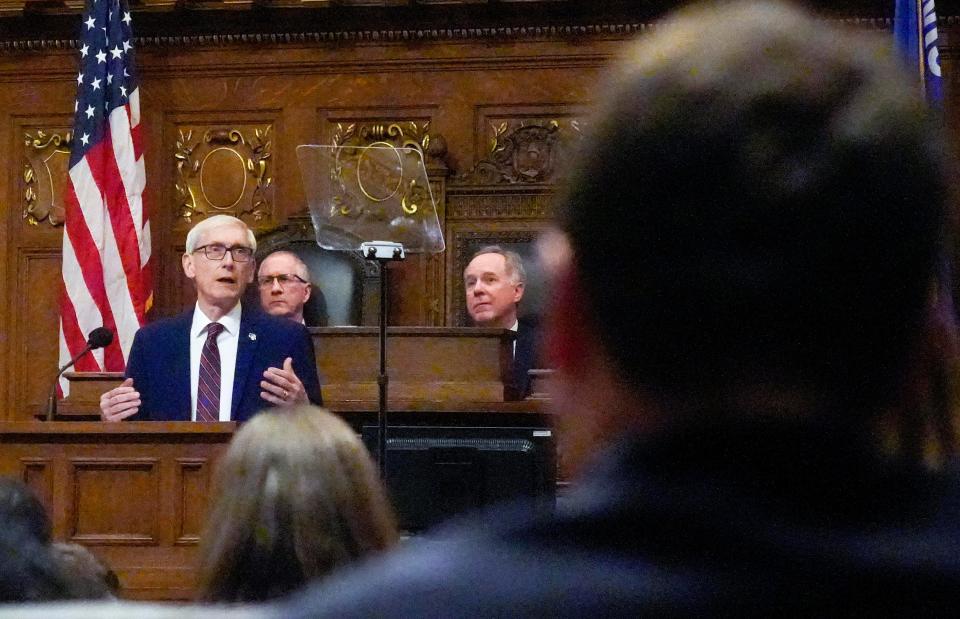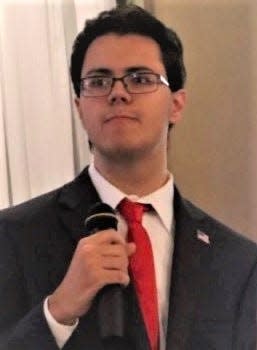Simple licensing change could help ease shortage of mental health professionals in Wisconsin
- Oops!Something went wrong.Please try again later.
What’s good for our kids is what’s good for the state. That was Tony Evers’ campaign slogan last year, when he won re-election to a second term as governor.
As a lifelong educator, the governor professes compassion for children. This is something that both sides of the aisle can agree on. Right now is a golden opportunity to take a simple step to help thousands of children without spending a single taxpayer dollar: allowing qualified mental health professionals from other states to treat people in need.
In his State of the State address last month, Evers proclaimed 2023 as the “Year of Mental Health” to highlight the increased struggles that Wisconsinites are having. On this, he is right. Mental health deserves attention - data from the National Institutes of Health shows that over 20% of American adults are living with a mental illness. That percentage jumps to 49% of adolescents aged 13-18.
For many young people in Wisconsin, including myself, this issue isn’t esoteric data - it’s personal. Last fall, amid the stress of school, work, and life in general, my mental health began to suffer, and I had a panic attack.
After the initial episode passed, I tried to find a therapist to help me. As I began this search, one thing became immediately clear: there is a dangerous shortage of mental health professionals in Wisconsin. Nearly everywhere I called was booking weeks out for a virtual appointment, and months out for an in-person one. I’m not the only one: a 2021 report from Evers’ own Office of Children’s Mental Health found that even before the pandemic, there weren’t enough mental health professionals in Wisconsin to meet demand, and tragically the pandemic has only made demand worse.

At the State of the State, Evers announced a 40 agency, $500 million plan to improve mental health care in Wisconsin. While this plan may appear comprehensive, it’s missing one key policy change that would be immediate, cost nothing, and likely be greeted with bipartisan support - universal licensing recognition for all mental health professionals.
In order to practice medicine in Wisconsin, a person must be licensed to do so by the Wisconsin Department of Safety and Professional Services (DSPS). This makes sense - people who work with the health and safety of Wisconsinites should be qualified. But in an emergency like the mental health crisis we’re currently experiencing, people who need help can’t wait for bureaucracy.
Nineteen states already have universal recognition, allowing professionals who are licensed anywhere in America to easily and immediately work there. This concept is simple - a doctor who practices in Iowa doesn’t forget how to do their job once they cross the state line, so our government shouldn’t treat them like they do. If lawmakers worked with Evers to eliminate the requirement for Wisconsin-specific licenses, mental health professionals from as close as Illinois or as far away as Alaska could immediately give help to Wisconsinites who need it through telehealth.

This may sound like a new idea for our state, but it’s not. In the early days of the COVID-19 pandemic, Evers signed Emergency Order #16, which temporarily enacts universal recognition for health care providers to help alleviate the shortage during the pandemic. If he believed these providers were qualified two years ago, surely he would agree that they are still qualified today.
In the governor’s budget, he proposed giving DSPS the authority to allow for limited reciprocity through the slow moving rules process at the discretion of the secretary. This would not deliver the reform Wisconsin needs. Whether through legislation or through the budget bill, the legislature should allow out-of-state mental health professionals to help people in Wisconsin now and for the foreseeable future. We don’t need to wait for the bureaucracy to do it and we certainly don’t need to spend hundreds of millions of dollars to do it either.
As for me, I ended up finding a therapist and am getting the help I need. But too many young people like me haven’t. Evers and the legislature have a chance to help all of us without spending a single taxpayer dollar, making permanent this simple policy solution that saved lives at the height of the pandemic. Get government out of the way and let mental health professionals provide the help that Wisconsinites need.
Benjamin Garbedian, of Waukesha, is a senior at Carroll University studying political science and communication. He currently serves as Hamilton Roddis Student Fellow at the Institute for Reforming Government.
This article originally appeared on Milwaukee Journal Sentinel: The Evers administration has simple tool to make good on mental health pledge.

